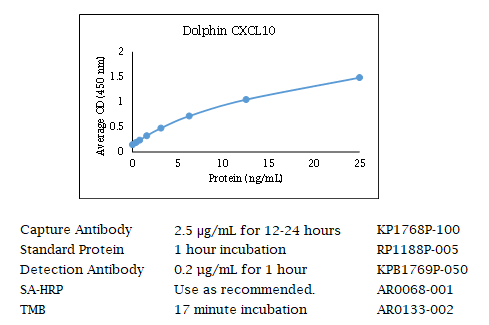Dolphin CXCL10 (IP-10) Polyclonal Antibody
C-X-C motif chemokine 10 (CXCL10) also known as Interferon gamma-induced protein 10 (IP-10) or small-inducible cytokine B10 is a member of the C-X-C chemokine family. CXCL10 (IP-10) is secreted by several cell types in response to IFN-gamma. These cell types include monocytes, endothelial cells and fibroblasts. CXCL10 (IP-10) has been attributed to several roles, such as chemoattraction for monocytes/macrophages, T cells, NK cells, and dendritic cells, promotion of T cell adhesion to endothelial cells, antitumor activity, and inhibition of bone marrow colony formation and angiogenesis. There have been 17 different C-X-C chemokines described in mammals, that are subdivided into two categories, those with a specific amino acid sequence (or motif) of glutamic acid-leucine-arginine (or ELR for short) immediately before the first cysteine of the C-X-C motif (ELR-positive), and those without an ELR motif (ELR-negative). ELR-positive C-X-C chemokines specifically induce the migration of neutrophils, and interact with chemokine receptors CXCR1 and CXCR2. C-X-C chemokines that lack the ELR motif are chemoattractant for lymphocytes. CXCL10 (IP-10) elicits its effects by binding to the cell surface chemokine receptor CXCR3.
Reactivity - ELISA
Bovine CXCL10 - None
Canine CXCL10 - None
Caprine CXCL10 - None
Cynomolgus Monkey CXCL10 - None
Dolphin CXCL10 - Strong
Equine CXCL10 - None
Feline CXCL10 - None
Ferret CXCL10 - None
Guinea Pig CXCL10 - None
Human CXCL10 - None
Mouse CXCL10 - None
Ovine CXCL10 - None
Rabbit CXCL10 - None
Rat CXCL10 - None
Swine CXCL10 - Strong
Dolphin CXCL10 ELISA Data

Ordering Information & Terms and Conditions
We require a phone number and e-mail address for both the end user of the ordered product and your institution's Accounts Payable representative. This information is only used to help with technical and billing issues.
Via Phone
Please call us at 651-646-0089 between the hours of 8:30 a.m. and 5:30 p.m. CST Mon - Fri.
Via Fax
Orders can be faxed to us 24 hours a day at 651-646-0095.
Via E-mail
Please e-mail orders to orders@KingfisherBiotech.com.
Via Mail
Please mail your order to:
Sales Order Entry
Kingfisher Biotech, Inc.
1000 Westgate Drive
Suite 123
Saint Paul, MN 55114
USA
Product Warranty
Kingfisher Biotech brand products are warranted by Kingfisher Biotech, Inc. to meet stated product specifications and to conform to label descriptions when used, handled and stored according to instructions. Unless otherwise stated, this warranty is limited to one year from date of sale. Kingfisher Biotech’s sole liability for the product is limited to replacement of the product or refund of the purchase price. Kingfisher Biotech brand products are supplied for research applications. They are not intended for medicinal, diagnostic or therapeutic use. The products may not be resold, modified for resale or used to manufacture commercial products without prior written approval from Kingfisher Biotech.
Payment Terms
All prices are subject to change without notice. Payment terms are net thirty (30) days from receipt of invoice. A 1.5% service charge per month is added for accounts past due over 30 days. Prices quoted are U.S. Dollars. The purchaser assumes responsibility for any applicable tax. You will only be charged for products shipped. Products placed on back order will be charged when shipped. If you place an order and fail to fulfill the terms of payment, Kingfisher Biotech, Inc. may without prejudice to any other lawful remedy defer further shipments and/or cancel any order. You shall be liable to Kingfisher Biotech, Inc. for all costs and fees, including attorneys' fees, which Kingfisher Biotech, Inc. may reasonably incur in any actions to collect on your overdue account. Kingfisher Biotech, Inc. does not agree to, and is not bound by, any other terms or conditions such as terms in a purchase order that have not been expressly agreed to in writing signed by a duly authorized officer of Kingfisher Biotech, Inc.
Shipping
Shipping and handling costs are prepaid and added to the invoice. Shipping and handling costs will be charged only on the first shipment in situations where an order contains back ordered products. Kingfisher Biotech, Inc. reserves the right to select the packaging and shipping method for your order, which will ensure the stability of the product and also efficient tracing. Domestic orders will normally be shipped by overnight. Damage during shipment is covered by the warranty provided in these terms and conditions. For international orders, title to the goods passes in the United States when the goods are placed with the shipper. For all orders, the risk of loss of the goods passes when the goods are placed with the shipper.
Returns
Please call customer service before returning any products for refund, credit or replacement. NO returns will be accepted without prior written authorization. Returns are subject to a restocking fee of 20%.



 New Products
New Products Ordering
Ordering Distributors
Distributors Resources
Resources FAQs
FAQs Cart
Cart